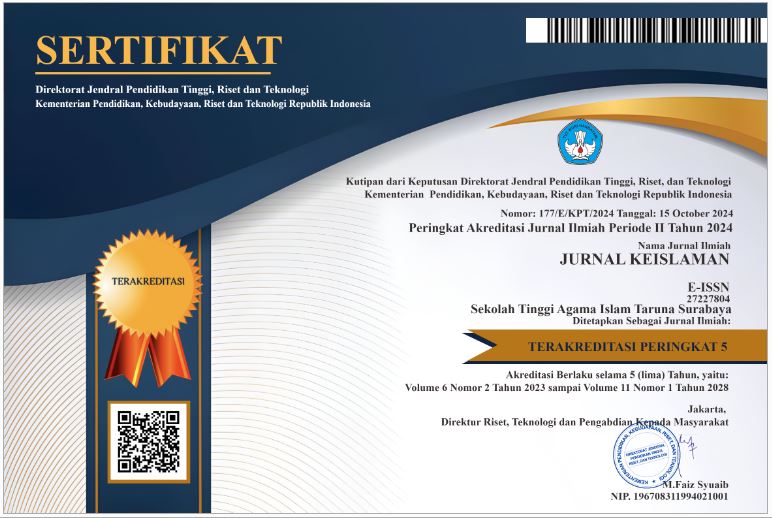Kepemimpinan Wanita dalam Perspektif Syariah dan Sosiologi Hukum: Fenomena Pemilihan Gubernur Jawa Timur Tahun 2024
DOI:
https://doi.org/10.54298/jk.v8i1.335Keywords:
Women’s Leadership, Sharia, Sociology of LawAbstract
This research aims to analyze women's leadership from the perspective of sharia and legal sociology, as well as the opinions of several intellectual religious experts in the East Java region regarding women's leadership in the realm of politics and government, especially in the context of the 2024 East Java Governor Election. The research method used are, namely 1) Field study data obtained from interviews with several East Java intellectual religious experts as well as documentation such as recordings and photos needed to support research, 2) literature study using data from various literature such as the Al-Qur'an, hadith related to leadership women, as well as academic studies and statutory regulations such as the Election Law. The results of the research show that from a sharia perspective, there are differences in the textual interpretation of verses regarding political rights and women's leadership among Muslims. However, in the sharia view, leadership is not determined by the gender of the leader, but rather their piety and ability to carry out their responsibilities as leaders. Meanwhile, a legal sociology perspective shows that legal regulations in Indonesia encourage women's involvement in politics and government.
Downloads
References
Apriani Batubara, Putri dan Nuri Aslami. "Kepemimpinan dalam Islam", Jurnal Ilmu Komputer, Ekonomi Dan Manajemen (JIKEM) 3, no. 2, (2023).
Asy’ari, Abdurrohman Al, dan Robingun Suyud El Syam. “Kepemimpinan Wanita Menurut Al-Qur’an (Kajian Komparasi Tafsir As-Sya’rawi Dan Shafwatut At-Tafasir Surat An- Naml Ayat 29-33”, Jurnal Pendidikan, Sains Sosial, Dan Agama 8, no. 1, (2022). https://doi.org/10.53565/pssa.v8i1.500.
Fattah, Nanang. 2013. Landasan Manajemen Pendidikan. Bandung: PT Remaja Rosdakarya. Hasanah, Hikmatul dan Suprianik. "Kepemimpinan Perempuan Perspektif Islam Dan Gender", An-Nisa Journal of Gender Studies 12, no. 1 (2019). <https://doi.org/10.35719/annisa.v12i1.6>.
Junaidah, Dwi Haryani, and Elsah Fanisyah. "Women’s Leadership in Creating Change, Synergy, and Empowering Human Resources in Madrasah", Al-Tanzim: Jurnal Manajemen Pendidikan Islam 7, no. 1 (2023). < https://doi.org/10.33650/al- tanzim.v7i1.4681>.
Kahanna, Mutia. "The Effectiveness of Women’s Leadership in the Digital Era", HUMANISMA: Journal of Gender Studies 5, no. 2 (2021). <https://doi.org/10.30983/humanisme.v5i2.4699 >.
Kamil dan Suriadi. “Kepemimpinan Perempuan Dalam Perspektif Al-Qur’an”, Tajdid 28, no. 1 (2021). https://doi.org/10.36667/tajdid.v28i1.550.
Putri, Dewi Kurnia, dan Risman Bustamam “Kepemimpinan Wanita Dalam Perspektif Al Quran Dan Hadist”, Jurnal Kajian Dan Pengembangan Umat 6, no. 2 (2023). https://doi.org/10.31869/jkpu.v6i2.4491.
Putry, Raihan. "Kepemimpinan Perempuan Dalam Perspektif Islam", Jurnal Mudarrisuna 4, no. 2 (2015). <http://dx.doi.org/10.22373/jm.v5i2.627>.
Sinn, Ahmad Ibrahim Abu. 2006. Manajemen Syariah: Sebuah Kajian Historis Dan Kontemporer. Jakarta: PT Raja Grafindo Persada.
Siti Khaerani, Nalis. 2018. "Peran Wanita Dalam Perubahan Sosial Melalui Kepemimpinan Posdaya", Sosietas 7, no. 1 (2018). https://doi.org/10.17509/sosietas.v7i1.10352
Sutikno, Sobry. 2018. Pemimpin Dan Kepemimpinan Tips Praktis Untuk Menjadi Pemimpin Yang Diidolakan. Mataram: Holistica Lombok.
Thoha, Miftah. 2007. Perilaku Organisasi Konsep Dasar dan Perilakunya. Jakarta: Rajagrafinfo Persada.
Trisnawati, Opy dan Subhan Widiansyah. "Kesetaraan Gender Terhadap Perempuan Dalam Bidang Pendidikan Di Perguruan Tinggi", Jurnal Pendidikan Sosiologi Dan Humaniora 13, no. 2 (2022). < https://doi.org/10.26418/j-psh.v13i2.54606>.
Winda, Helma. 2023. M A Yusuf, and Hoirul Anam, "Persepsi Kontroversi Kepemimpinan Wanita Pada Negara Mayoritas Muslim Di Indonesia’, JUSMA: Jurnal Studi Islam dan Masyarakat 2, no. 1 (2023). <https://doi.org/10.21154/jusma.v2i1.1481>.
Downloads
Published
How to Cite
Issue
Section
License
Copyright (c) 2025 Zuman Malaka

This work is licensed under a Creative Commons Attribution-ShareAlike 4.0 International License.
Authors who publish with this journal agree to the following terms:
- Authors retain copyright and grant the journal right of first publication with the work simultaneously licensed under a Creative Commons Attribution-ShareAlike 4.0 that allows others to share the work with an acknowledgement of the work's authorship and initial publication in this journal.
- Authors are able to enter into separate, additional contractual arrangements for the non-exclusive distribution of the journal's published version of the work (e.g., post it to an institutional repository or publish it in a book), with an acknowledgement of its initial publication in this journal.
- Authors are permitted and encouraged to post their work online (e.g., in institutional repositories or on their website) prior to and during the submission process, as it can lead to productive exchanges, as well as earlier and greater citation of published work (See The Effect of Open Access).


















